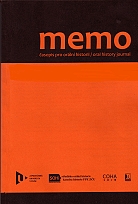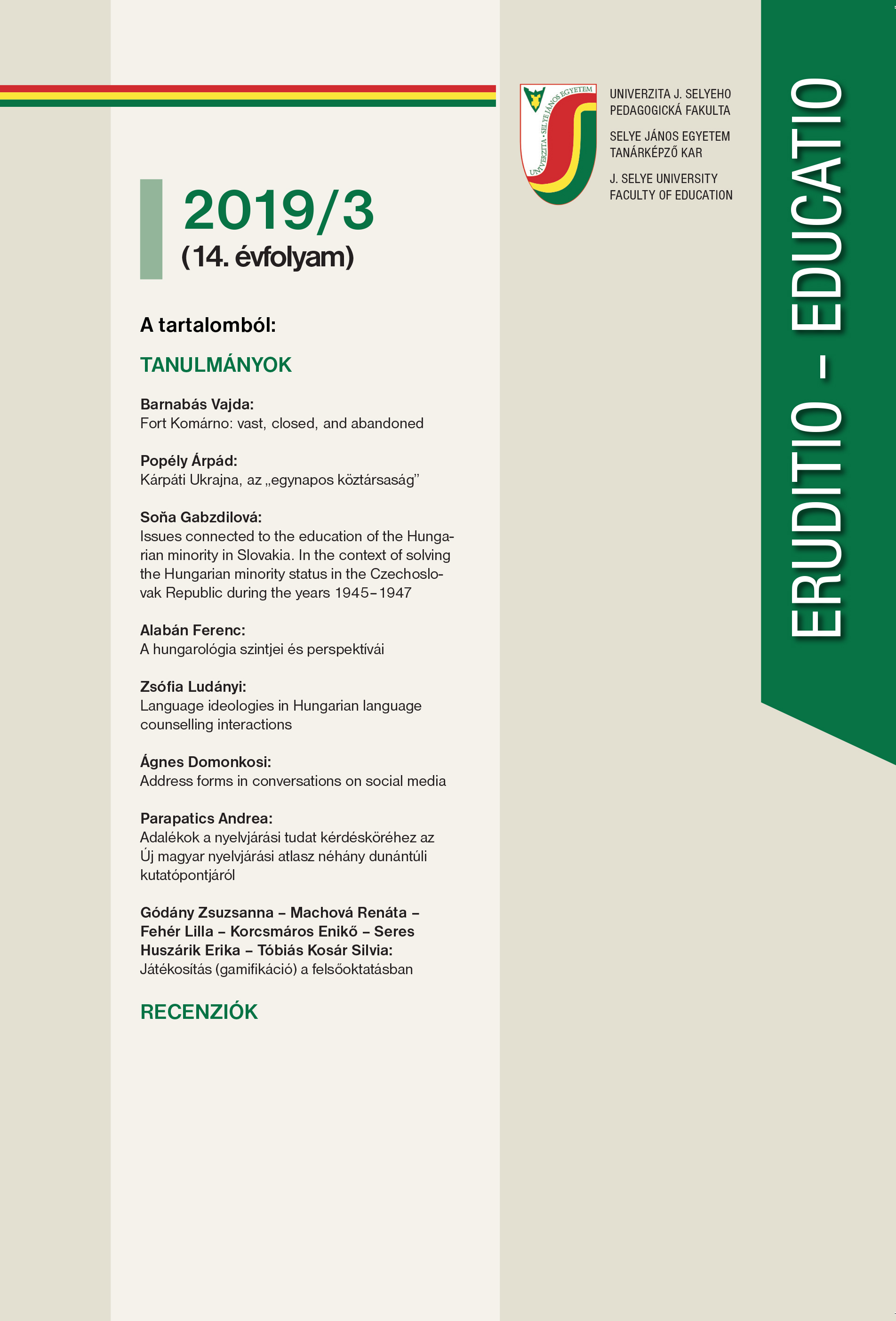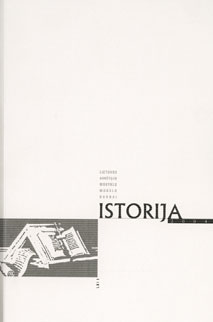
Petras Šalčius about the Lithuanians in Argentina
Matas Šalčius apie lietuvius Argentinoje
Keywords: P. Šalčius; Lithuanians in Argentina; letter; J. Aukštuolis; R. Skipitis
More...
Keywords: P. Šalčius; Lithuanians in Argentina; letter; J. Aukštuolis; R. Skipitis
More...
Keywords: Vilnius Pedagogical Institute; sovietisation; spreading of Russian culture; Marxism-Leninism; teachers; students; history
The author, on the basis of documents, literature and her own experience, aims to show the policy of russification and sovietisation after the second Soviet occupation. The data mainly refer to the Faculty of History at Vilnius State Pedagogical Institute. The institute lecturers, who worked in this faculty in the period of independent Lithuania, either emigrated from Lithuania or were not allowed to work at the institute. Thus, at first the teaching staff consisted mainly of secondary school history teachers, graduates from Kaunas Magnus University. In the course of a few years they were eliminated from the faculty on the initiative of the leaders of certain Soviet educational institutions or the communist party. All in all, till the death of Stalin, 25 lecturers were unfairly dismissed from their positions. Officially they were accused of collaborating with the resistance movement or adherence to the nationalistic bourgeois philosophy. Thus, they were considered unreliable as lecturers. From the first days of the Soviet occupation, history lecturers and other specialists were replaced by people who came from Russia or other Soviet republics. Many Russians, Ukrainians, Armenians became heads of the departments of Marxist disciplines, history lecturers or secretaries of the communist party. They introduced Stalinist methods of administration and regime based on fear and distrust.
More...
Keywords: Königsberg; Königsberg University; Lithuania Minor; Prussia; students; professors; Albertina
The author of the article investigates the national identity, background and descent of the students of Königsberg University (Albertina; 1544–1944) who studied there from its foundation until the 19th century. The study aims to define the number of students who came from the most protestant part of Prussia – Lithuania Minor (regions of Klaipėda and Königsberg) and from the Catholic Grand Duchy of Lithuania where the Reformation movement induced some part of the nobility to become protestants, i.e. evangelical Lutherans or reformists. In the years 1544–1800, about three hundred young people from Lithuania Minor and more than 640 from the Grand Duchy of Lithuania, the majority of them of Lithuanian origin, studied at this university. The research allows to claim that in the period of 1544–1900 the overall number of the students could be estimated as no less than 1040. The majority of graduates from this university of Lithuania Minor became priests, advocates, and supporters of the Lithuanian written language and culture as well as eminent social figures who worked for the sake of the Grand Duchy of Lithuania.
More...
Keywords: the Grand Duchy of Lithuania; Vilnius Cathedral; remains; epitaph; political publicist writings; anonymous author; historical consciousness
For a long time, Lithuanian historians have been trying to locate the remains of the Grand Duke of Lithuania, Vytautas. The information about the remains ends in the middle of the 17th century with the publication of Long time memory, a short relation about the transaction of Lithuanians and Moscow published in a collection of documents in 1734. It is alleged that when the Russian army attacked Vilnius and plundered the cathedral, the epitaph of the Grand Duke Vytautas was broken and his heart was thrown away from the golden box. The author of this article expresses some doubts about the authenticity of these facts because the available historical sources do not state that Vytautas’ heart was buried separately from his body. These historical sources do not contain any information about the breaking of Vytautas’ epitaph. The alleged disgrace of the remains of Vytautas, the Grand Duke of Lithuania, could be treated as an attempt to exaggerate the scale of the Russian army’s plundering of Vilnius.
More...
Keywords: Pope; papal nuncio; lithuanisation of the Church; the bishop of Vilnius; the administrator of the Vilnius diocese
The article deals with a question of Lithuanian bishop in Vilnius diocese in 1917–1918. One of the candidates was canon K. Olšauskas who was supported by M. Ercberger, a representative of Germany’s Catholic centre. When Poland was declared an independent state, it started the policy of restoring the Polish-Lithuanian Commonwealth. The idea was supported by the administrator of Vilnius diocese prelate K. Michalkevičius. This aroused great dissatisfaction among Lithuanians, even demands to resign. In June 1918, the Germans dismissed Michalkevičius from the administrator’s position in Vilnius diocese thus trying to support Olšauskas. However, this step did not render expected results because Olšauskas’ nationalism was not acceptable to Poles who had strong positions and influence in Rome. After Germany’s defeat Olšauskas lost his political backing and, at the same time, the above mentioned position. Most of the inhabitants in Vilnius and its regions were of Polish descent, their native language was Polish, thus the Church could not be Lithuanised by force; time, patience and diplomacy were necessary for certain changes to take place. Thus only in October of 1918 J. Matulevičius-Matulaitis, a person who was acceptable both to Poles and Lithuanians, was appointed bishop of Vilnius.
More...
Keywords: Nationalism; nation; native language; national consciousness; national ideal; Petras Klimas; Anthony Smith
This article examines the political, cultural and national ideas and concepts of Klimas such as nation, nationalism, nation state, statehood, the role of the language, national consciousness, national ideal, i.e. how he understood nationalism. His concepts and views on national questions are compared with the concepts and theories of some of the most prominent scholars of nationalism of the 20th century. The article’s author point out, that Klimas refers to the ethnic-national law as a universal one, by which one can define the concept of a nation, determine the ethnic territory of a new state, and describe nationalism as the impulse of the nation to build a nation state. As a proponent of historical materialism, P. Klimas regarded the ethnic-national law as a material phenomenon that could be divided into four elements: 1. Language; 2 National consciousness; 3. Culture; 4. The vision of the future – the national ideal. The author is doing conclusion that from the theories of modern researchers on nationalism, who stressed the importance of ‘ethnic factors’ and argued that a population ought to become independent on the basis of such factors, Anthony Smith’s ethnicistic theory is closest to Klimas’ concept of nationalism.
More...
Keywords: the textbook analysis; the Vilnius question; the Lithuanian and Polish conflict; Soviet Lithuanian historiography; the formation of historical consciousness; ‘the joining of the Lithuanian lands’; Ziemie Odzyskane
The article seeks to analyse how Soviet Lithuanian textbooks of History, published in 1957–1988, explain the territorial conflict between Lithuania and Poland in the interwar period. The author claims that Soviet textbooks emphasise the fact that Lithuania regained Vilnius only due to the Soviet Russia in 1920 and the USSR in 1939. It is also claimed that Lithuania, being part of the USSR, for the first time in its history joined Vilnius and Klaipėda into one united state (since 1945). Such an attitude was expressed in the textbook written and published by Juozas Jurginis (the History of the Soviet Socialist Republic of Lithuania, 5 editions in 1957–1961). In the later textbooks of other authors the national focus became weaker and the attention was centred on an overworked class-based approach towards the history of Lithuania as well as on the strengthening of the communist ideology.
More...
Keywords: Archaeology; Žemaitiskė; pole dwelling site; late Neolithic age; building; constructions; dendrological research
The article deals with Žemaitiskė 2 dwelling site which dated to the late Neolithic and belongs to the pole dwelling sites found in Lithuania. Wooden buildings were temporary. This settlement was built on the platform supported by poles, the diameter of which is 6/8–14/16 centimetres. Next to this settlement fishing equipment was found – wooden enclosures with fishing-baskets. Dendrological researches allow to estimate that buildings on poles were constructed either in spring or at the beginning of summer mostly from ash-tree wood. Radiological investigations of wood confirm the overlapping of certain constructions. It should be also mentioned that this dwelling site on poles and other archaeological findings were left by the inhabitants of Narva culture – fishermen and hunters.
More...
Keywords: Minkowski; Minkowskian Sum; special theory of relativity
This is a article about the merits of the members of the glorious the Minkowski’s family, which is comes from Lithuania: Oskar Minkowski, one of the discoverers of insulin, Hermann Minkowski, a well-known mathematician and physicist, who who was one of the originators of the special theory of relativity, and Rudolf Leo Bernhard Minkowski, a well-known astrophysicist, director of the Mount Palomar observatory.
More...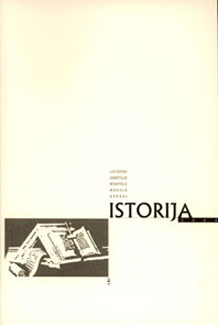
Keywords: Lithuanian sources; archives of the Northern countries
More...
Keywords: Consulates; Lithuania’s Honour Consulates; Norway; Lithuanian Consular Board
The article deals with the following issues: to define stages in establishing and developing Lithuania’s Honour Consulate network in Norway, to investigate the motives and circumstances for the establishment of the General Honour Consulate in Oslo, Vice-consulate in Oslo, Consulates in Oslo and Bergen and to sequentially disclose the activities of these Consulates in political, cultural, and economic spheres in 1926–1940. The formation, functioning and development of Lithuania’s Honour Consulates in 1925–1940 can be divided into three stages: 1926, 1930–1931, and 1937. In 1926 the major goal was to get moral and political support in solving Lithuania’s problems concerning Vilnius and Klaipėda regions and to stimulate grain export to Norway. In 1930–1931 the major aim was to gain experienced and influential partners and through them disseminate Lithuanian culture in Norway. In 1937 the Consulates’ priorities were to increase agricultural production export, to develop commercial fleet, and to hold off anti-Lithuanian tendencies in the Norwegian mass media.
More...
Keywords: The Dubysa Castle; everyday life; the Teutonic Order; clothes; footwear; cuisine; drinks
The authors of the article describes the everyday life in Dubysa Castle of the Teutonic Order which was standing near the present Seredžius town in year 1406–1409 approximately – it was the most important fortress of the Teutonic Order in Lithuania at the time. Dubysa Castle was not only a defensive and administrative building but also an important economic centre. Inhabitants of the castle could be divided into three groups: administration, soldiers, and servants. We may find out from historical resources that the castle inhabitants were provided with the necessary clothing, food, beer, and oat for horses. The authors from the sources pointed out that a priest lived in the castle almost all the time; it is very probable that a chapel was built inside the castle. Data about the clothing, food, and other everyday habits of Dubysa Castle inhabitants provides us the general information about everyday live in other castles of the Teutonic Order that were constructed in the territory of Lithuania.
More...
Keywords: Museum; etnocosmology
More...
Keywords: History; teaching; attitude; pupils; content
The article presents data of pupils’ sociological survey which aimed to throw some light on pupils’ attitude towards teaching/learning history. About 85% of pupils claim their willingness to learn history because they find out many interesting facts about people’s life in the past, and they can apply this factual historical knowledge to their everyday life, communicating with other people. Pupils like world history, especially ancient period and, to a lesser extent, medieval period. As far as Lithuanian history is concerned, pupils are more interested in the 20th century because of significant events about which they hear authentic stories. They also like to learn about the period of the Grand Duchy of Lithuania when Lithuania was a powerful and influential country. Interesting fact to note is that boys’ and girls’ attitudes towards history learning are not adequate. Boys are more interested in politics, scientists’, and military leaders’ biographies. Girls prefer topics on culture, religion, people’s daily life, famous artists’ lives and activities.
More...
Keywords: the Upytė land; past of Panevėžys; town
More...
Keywords: State Automobile Inspectorate; traffic controllers; safe traffic; traffic maintenance control
The author of the article, discussing the legal status of Lithuania’s State Road Transport Department, argues that in the period of the second Soviet occupation this institution was greatly dependant on the State Road Transport Department of the Soviet Union. The author also investigates the following issues: the foundation of this institution, its functions and activities as well as the problems of transport system, traffic safety and its maintenance. Emphasis is laid on the fact that the Department was not the only institution responsible for the maintenance of traffic security. A number of ministries as well as state and public organisations became actively involved in this activity in the ninth decade of the 20th century. As a result, there appeared notable changes in public attitudes towards traffic safety and corresponding requirements.
More...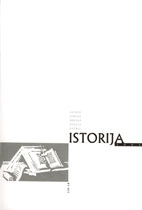
Keywords: Duma; Russia; Lithuanians; representatives; nation; democracy
The article deals with the Lithuania’s representatives of the Duma in 1906. Among Duma’s 500 representatives, the Lithuanian provinces had the right to elect 22 representatives to the Duma, the national distribution being as follows: 10 Lithuanians, 5 Poles, 2 Russians, 3 Jews, and 2 Byelorussians. Working in different commissions and subcommissions, participating in legislative activities and expressing their opinion in the state Duma, Lithuania’s representatives raised issues relevant to Lithuanians and other national minorities within the Russian empire, such as cultural autonomy, justice, law and order, democratic freedoms and land reform. Moreover, the participation of Lithuania’s representatives in the Duma strengthened their own political maturity as well as served national interests, i.e. propagated Lithuania’s aims among other nations under the imperial subjugation, acquainted them with Lithuania’s history and the aspirations of its people.
More...